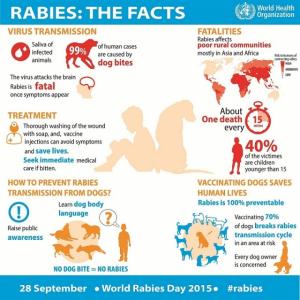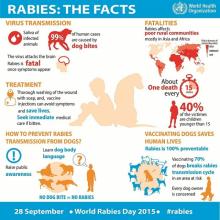WHO joins international calls to invest more in defeating human rabies transmitted by dogs
28 September 2015 - The World Health Organization (WHO), The Food and Agriculture Organization of the United Nations (FAO) and the World Organisation for Animal Health (OIE) unite in urging countries to develop appropriate investment strategies to eliminate human rabies - a disease mainly transmitted to humans through the bite of an infected dog and is widespread in low-income countries, with little or no domestic dog management or vaccination programmes.
“Rabies is preventable at source by vaccinating dogs” says Dr Bernadette Abela-Ridder, Team Leader, Neglected Zoonotic Diseases at WHO Geneva, Switzerland. “Decline in human rabies deaths closely mirrors that of rabies in dogs and investments are needed now to roll out elimination programmes in affected communities and countries.”
On World Rabies Day today, WHO, FAO and OIE, in collaboration with the Global Alliance for Rabies Control (GARC), have published a Rationale for investing in the global elimination of dog-mediated human rabies which calls on countries to invest in cost-effective and sustainable control programmes, particularly in the mass vaccination of dogs.
Pilot programmes have successfully demonstrated that elimination of rabies is achievable mainly through mass dog-vaccination campaigns, supported by improved access to post-exposure prophylaxis (post-bite treatment) immediately after a suspected dog-bite. Over 95% of human cases are due to dog bites and, unlike many other diseases, the tools required to tackle this neglected disease are available.
Rabies which mainly affects the rural poor and marginalised populations continues to kill tens of thousands of people every year. Almost 40% of victims exposed to dog-bites are children under the age of 15.
Post-exposure prophylaxis can be effective in preventing human rabies deaths. However the approach is costly and can only protect individuals who have prompt access to select health facilities that provide the treatment. Mass vaccination of dogs is proven to be the most cost-effective means of preventing human rabies deaths and eliminating its transmission.
Rationale for investing in the global elimination of dog-mediated human rabies makes the case that global freedom from dog-mediated human rabies is feasible. Investment is needed to involve communities and strengthen local initiatives in training people and volunteers carry out coordinated dog-vaccination campaigns to enable geographical and wider dog population coverage in endemic countries.
Investment is also needed to support and sustain control programmes at national and regional levels. For example, setting up regional rabies vaccine banks can support countries in their control efforts. Initially set up in Asia, the OIE regional rabies vaccines banks are now also used by the WHO to procure rabies vaccines for dog vaccination in Southern Africa and the Philippines.
A recent WHO-led pilot project in the Philippines, South Africa, the United Republic of Tanzania has demonstrated that mass vaccination of dogs can drastically reduce and eliminate human rabies deaths.
Another example of a successful rabies elimination programme is Bangladesh where a mass dog vaccination campaign between 2011 and 2013 resulted in reducing human rabies deaths by 50%. Building on the success of its national elimination programme, Bangladesh plans to reduce human rabies deaths by 90% by the end of this year and achieve elimination by 2020.
Rationale for investing in the global elimination of dog-mediated human rabies lists some conditions for a successful rabies control programme:
effective and safe vaccines for dogs and for humans;
practical guidance to implement rabies control programmes;
education and awareness modules for community involvement;
data collection and surveillance systems, which are critical for evaluating the progress of control and elimination campaigns.
Furthermore, collaboration between human and animal health sectors through the ‘One Health’ approach is essential to achieve success at national, regional and global levels. WHO, OIE and FAO, together with GARC are committed to support countries building technical capacity and through sharing of expertise. WHO/OIE and FAO are initiating a conference on the global elimination of dog-mediated human rabies scheduled for 10-11 December 2015 at WHO headquarters in Geneva.




